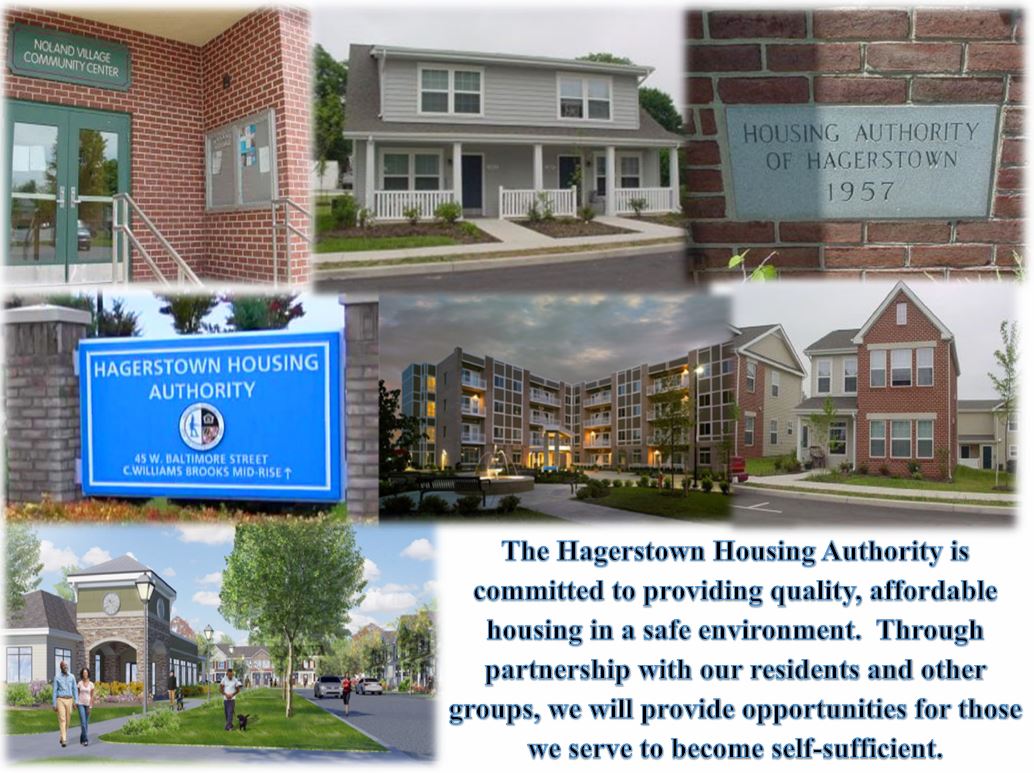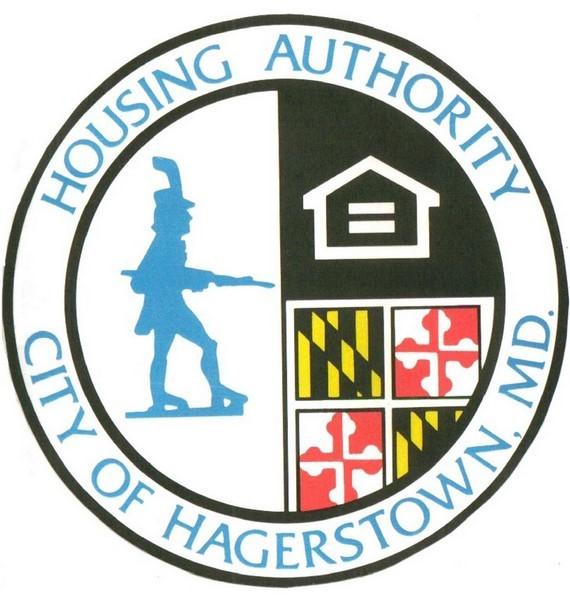Landlords
This page contains information for current and prospective Housing Choice Voucher landlords. Scroll down to select a topic that you would like additional information on.
What is the Housing Choice Voucher Program?
The Family
The Housing Authority
The Landlord
Enters into a Housing Assistance Payment (HAP) contract with the housing authority. Agrees to maintain the property to Housing Quaility Standards (HQS).
Benefits of Becoming a
Housing Choice Voucher Landlord
HHA wants to reach out to new landlords in Hagerstown to promote the benefits of becoming a Housing Choice Voucher landlord. In addition to the satisfaction of knowing that you are providing safe, decent housing to low income families in our community, the following are a few of the benefits:
Timely Payment
Owners have security in knowing at least a portion of the rent will be paid timely each month.
Fair Rents
Rent amounts are based on Fair Market Rents determined and published by HUD.
Inspections
HHA will regularly inspect your property to ensure it is being properly maintained.
Your Lease
Landlords use their own lease and set the terms and conditions in the lease.
Payment Standards and Fair Market Rents
The subsidy for most families is the difference between 30 percent of the family’s adjusted monthly income and a “payment standard” that is based on the HUD-published Fair Market Rents (FMRs). If the rent is more than the payment standard, the family pays a larger share. A family may not pay more than 40% of their adjusted monthly income for rent when the family first receives Housing Choice Voucher assistance, or when a family moves to a new unit.
No cap exists on the rent. However the unit rent, plus any utility allowance for family-paid utilities, must be reasonable in relation to comparable units on the local rental housing market. The following are HUD-published Fair Market Rents and Housing Authority Payment Standards for the local housing market:
.
Payment Standards
| 0 BR | $850 |
| 1 BR | $981 |
| 2 BR | $1,272 |
| 3 BR | $1,807 |
| 4 BR | $2,013 |
| 5 BR | $2,314 |

Fair Market Rents
| 0 BR | $709 |
| 1 BR | $818 |
| 2 BR | $1,060 |
| 3 BR | $1,506 |
| 4 BR | $1,678 |
| 5 BR | $1,929 |
Inspection Information
Inspections are required of all Housing Choice Voucher properties. This section will provide you with insight on what our inspectors will check during these inspections.
Lead Paint
Exterior
- Handrails are required for all stairs with 4 or more steps
- Guardrails around any porch over 30″ above grade
- All outbuildings are in good repair and are safe
- All fences and gates are intact and in proper working order
- All walkways are free of tripping hazards
- Spouting is in good working condition
- Yard is free of trash, debris and noxious weeds
Interior Walls and Ceilings
- Surfaces are to be free of holes and cracks
- All wall and ceiling covering material has to be secure and in good repair
Kitchen
- Sink and all hardware has to be properly installed and free from leaks and/or obstructions
- Range hood, if present, has to work properly-filter needs to be clean and intact
Refrigerator:
- Maintains a constant proper temperature
- Has all door bars and brackets
- Has all shelves and drawer
- Door gaskets are free from tears and/or splits
- Must be clean
Stove:
- Maintains proper cooking temperature
- All burners must work as intended
- Oven door gasket
Utilities
If a utility is to be paid by the tenant, then that utility can only serve the unit occupied by the tenant, and the utility has to be
separately metered. All tenant paid utilities must be put in tenants name prior to unit passing inspection.
Required utilities are:
• Heat
• Hot Water
• Electric
• Water/Sewer/Trash
Smoke Detectors
Interior Windows
- All glass and glazing material has to be intact-small cracks in the window glass can be caulked using clear silicone caulking
- Need to open and hold open using window hardware-can not be propped open
- All 1st floor windows have to be lockable
- All windows with access from the outside have to be lockable
- A minimum of I intact window screen is required per room in which a window is present. All screens must be in good
condition. (No holes or tears.)
Floors
- All floors are to be free of holes and cracks
- All floor covering material has to be clean and in good repair
- Bathroom and Kitchen floors have to be impervious to water
Bathroom
- Sink, toilet, bathtub/shower and all hardware have to be properly installed and free from leaks and/or obstructions
- Stoppers or stopper mechanisms are required for bathtub and sink
- Bathtub faucet has to be above the flood rim level of the tub
- Must have a window that opens to the outside, or a mechanical vent that exhaust to the outside
Certifications and Licenses
- Any building built pre-1950 has to have a Maryland Department of the Environment Lead Paint Inspection certificate. This inspection must be done between tenants
- A City of Hagerstown rental license-check with the City of Hagerstown
Emergency Exits
Interior Doors
- Need to shut and latch
- No double keyed deadbolts
- No locks on the outside of an interior door
- All door hardware must be intact and functioning as intended
Electrical
- All habitable rooms must have a minimum of 2 separate and remote receptacles
- Kitchen and bathrooms must have a permanently installed light fixture.
- Bathrooms have to have a minimum of I receptacle. All receptacles in the bathroom have to be Ground Fault Circuit Interrupter (GFCI) protected receptacles
- All receptacles within 6 feet of the kitchen sink have to be GFCI protected
- Light fixtures designed to have a globe or shade, must have a globe or shade
- All light bulbs need to be in place and functional
- Floor mounted receptacles have to have an exterior cover
- All exterior receptacles have to be GFCI protected and have an exterior cover
- Receptacle covers and switch plates have to be free from cracks and/or breaks
- No missing knock-outs or circuits in the panel box
- Exposed electrical connections/splices must be in approved junction boxes
Living Room and Bedroom
- A window with screen
- 2 separate and remote receptacles
- Ceiling light fixture and/or switch controlled outlet
- If the room is a pass through to another room, then the doors have to open into the farthest room
Miscellaneous
- Furnace emergency shut off switch has to be at a remote location away from the furnace-Top of basement stairs
- The discharge relief pipe on the water heater has to extend to within 4-l0″ of the floor, and be the size as the pressure relief valve.
- House numbers have to be 4″ in height and visible from the street, and are also required in the rear if the unit backs to an alley.
- Dryer must be vented to the outside
Frequently Asked Questions
How does participation benefit the landlord?
What standards must the property meet?
How may a landlord obtain information about the suitability of an applicant?
What is the term of the assisted tenancy?
May a landlord collect a full security deposit?
What are the major responsibilities of participating families?
What are the major responsibilities of landlords?
How does a landlord participate?
How does a family apply?
Are there any restrictions on the selection of a family?
May a landlord use a private market lease?
How may a lease terminate?
What are the major responsibilities of the Housing Authority?
How is the rental subsidy amount determined?
No cap exists on the rent. However the unit rent, plus any utility allowance for family-paid utilities, must be reasonable in relation to comparable units on the local rental housing market.
Landlord Portal
The Hagerstown Housing Authority has partnered with Yardi Systems
to expand our ability to interact with landlords online. The landlord portal will display information
on scheduled and completed inspections, direct payment setup, and more!
Contact Us
Hagerstown, MD 21740
